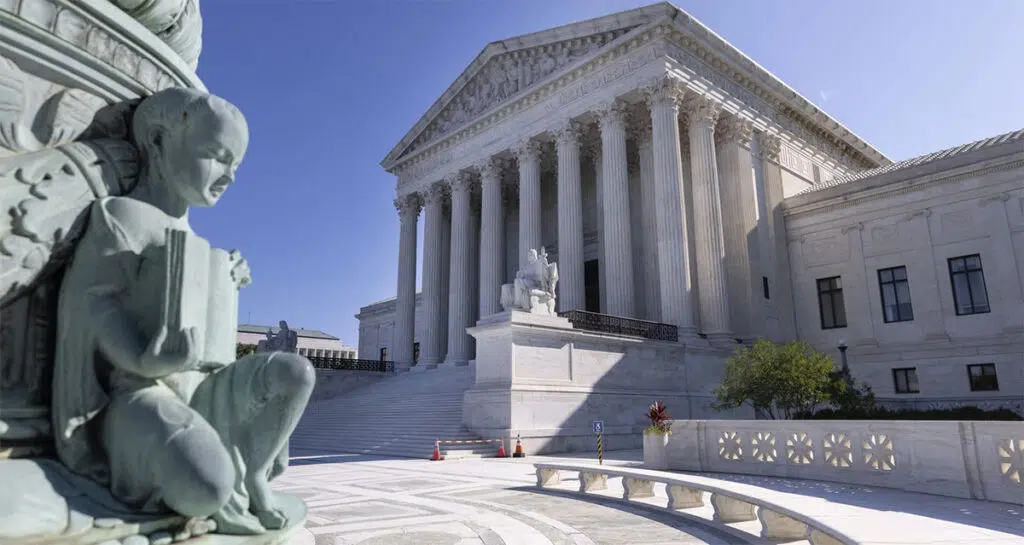
Constitutional attorney sees no change from Supreme Court ruling in Murthy v. Missouri
The First Amendment’s principles remain the same after Wednesday’s U.S. Supreme Court ruling in a case alleging President Joe Biden’s administration coerced social media companies to censor information, according to the leader of the Freedom Center of Missouri.
“This is a punt or another way of saying they kicked the can down the road,” Dave Roland, the director of litigation and co-founder of the Freedom Center of Missouri, said in an interview with The Center Square. “… From a free speech perspective, it’s better for the court to punt on the facts than to come down with the decision that what the government did was OK.”
In Murthy v. Missouri, the court ruled five citizens and the states of Louisiana and Missouri failed to prove they were injured by the Biden administration’s actions. They alleged a government campaign pressured social media companies to censor conservative viewpoints during the COVID-19 pandemic.
In a 6-3 decision, Supreme Court Justice Amy Comey Barrett wrote a 29-page opinion for the majority disagreeing with the arguments.
“We reject this overly broad assertion,” wrote Barrett, who was joined by Chief Justice John Roberts and Justices Kentanji Brown Jackson, Sonia Sotomayor, Elana Kagan and Brett Kavanaugh. “As already discussed, the platforms moderated similar content long before any of the government defendants engaged in the challenged conduct. In fact, the platforms, acting independently, had strengthened their pre-existing content moderation policies before the government defendants got involved.”
Justice Samuel Alito wrote a 34-page dissent and was joined by Justices Neil Gorsuch and Clarence Thomas.
“For months in 2021 and 2022, a coterie of officials at the highest levels of the Federal Government continuously harried and implicitly threatened Facebook with potentially crippling consequences if it did not comply with their wishes about the suppression of certain COVID-19-related speech,” Alito wrote. “Not surprisingly, Facebook repeatedly yielded.”
During oral arguments in March, Barrett quickly voiced disagreement with Louisiana Solicitor General Benjamin Aguiñaga for his interpretation of the First Amendment.
“The FBI sees these posts and calls the social media outlet, like X, Facebook, whatever, and says we really encourage you to take these down because these are significantly threatening and we see some people may be responding to them,” Barrett said. “That’s a problem?”
“… as I say, I’m a purist on the First Amendment,” Aguiñaga told Barrett.
Roland said Aguiñaga’s “maximalist argument” was a turning point.
“They were basically arguing that the government should not even be allowed to communicate with these private companies to express its views on information individuals were posting,” Roland said. “That was never going to fly. … It was clear the justices were not buying it.”
Missouri Republican Attorney General Andrew Bailey, who continued the case after it was filed under Eric Schmitt before his election to the U.S. Senate, didn’t mention the verdict on Wednesday in a media release. Even though the ruling reversed the Fifth Circuit Court and remanded the case for further proceedings, Bailey emphasized the ability to continue the case.
“The record is clear: the deep state pressured and coerced social media companies to take down truthful speech simply because it was conservative,” Bailey, who’s running for the GOP nomination for attorney general after being appointed to the position by Republican Governor Mike Parson after Schmitt’s election, said in a statement. “Today’s ruling does not dispute that. My rallying cry to disappointed Americans is this: Missouri is not done. We are going back to the district court to obtain more discovery in order to root out Joe Biden’s vast censorship enterprise once and for all.”



